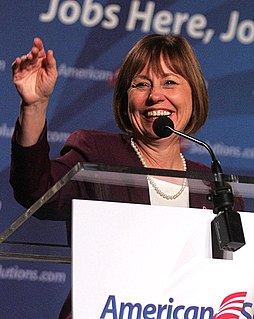A Quote by Nick Offerman
I never went too long without a job. The problem was a lot of the early jobs are almost more demoralizing than unemployment.
Related Quotes
You can make more money on unemployment than you can going down and getting one of those jobs that is an honest job, but it doesn't pay as much. And so, that's what's happened to us is that we have put in so much entitlement into our government, that we really have spoiled our citizenry and said you don't want the jobs that are available.
I've heard the argument that unemployment benefits somehow act as a disincentive to the long-term unemployed when it comes to looking for work, but the opposite is true. Unemployment Insurance serves as a powerful incentive for people to keep searching for jobs, rather than drop out of the labor force altogether.
The best solution would be better strategies for more rapid economic growth and getting people jobs and increases in income. You should simply be clear about matching problems and solutions. If the problem is someone can't find a job because they don't have the skills and they need some retraining, extending emergency unemployment isn't going to solve that. You need the job training programs or the skills bills that come out of the House and are sitting in the Senate.
There are a lot of people who are moving from unemployment to disability rolls, and there are a lot of people who have been out of work for a long time who are unable to get jobs. And I think that from a long-term perspective, this is not just a human tragedy, but it's going to be a potentially big hit on the economy in the future.
For a long time, the humans are going to be better than the machines and so different parts of the job will be leveraged. In a way that's happened for centuries, and we've adapted. And it's made the people who had parts of their jobs automated more valuable and more productive to the extent that they are essential for the other components of their jobs.
I'm not yet convinced that we will face an unemployment problem created by AI. There will certainly be some occupations eliminated - drivers of vehicles, many production jobs, etc. Whether this creates mass unemployment depends on how quickly this happens. If it happens overnight, it will be a huge disruption.
Free migration within Europe means that countries that have done a better job at reducing unemployment will predictably end up with more than their fair share of refugees. Workers in these countries bear the cost in depressed wages and higher unemployment, while employers benefit from cheaper labor.
We've seen tremendous progress in many ways under President [Barack] Obama. I mean, if we think about where the economy was when he got in - you know, we were losing more than 700,000 jobs a month. The unemployment rate was skyrocketing. And now it's at under 5 percent, so there is a lot of progress that has happened.
In a fair society, the solution to unemployment is not to force people into workfare programmes which do little more than supply big companies with free labour. It's to create jobs that pay a living wage, for example, by investing in new sustainable infrastructure projects and boosting the jobs-rich low carbon economy.
In working on any one problem, such as higher minimum wages, so many other issues come into play, such as some businesses possibly closing down, thus creating fewer jobs and more unemployment and incentivizing companies to import more goods from abroad, which leads to even less employment at home, and so on.



































